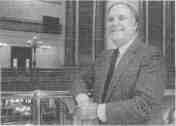 |
Home | Search | Browse | About IPO | Staff | Links |
 |
Home | Search | Browse | About IPO | Staff | Links |
|
POLITICS


by Charles N. Wheeler III
Notable achievements in any field of
human endeavor often present an
interesting problem: What do you do
for an encore? In the case of the
Illinois General Assembly this spring,
the answer may well be, "Not much."
The suspicion that 1996 will be a ho-hum legislative exercise in comparison
to the extraordinarily productive session of a year ago rests on a couple of
factors:
* The Republican majorities
pushed through most of their program
last year, much of it within the first
few weeks of the session. Cook County tax caps, tort reform, truth-in-sentencing, welfare changes — all those
high-profile GOP causes are now on
the books.
The items that are left, meanwhile,
tend to be ones on which GOP lawmakers are split, like workers compensation or downstate tax caps.
• Republican leaders are determined to avoid controversial issues this
spring that might jeopardize re-election for rank-and-file members — and
GOP legislative control — in the
November election.
Those political realities make all the
more noteworthy the relatively ambitious agenda Gov. Jim Edgar laid
before the legislature in his sixth State
of the State message last month.
The governor said he expected a
"realistic and politically doable" plan
from an education finance task force
headed by former University of Illinois President Stanley Ikenberry.
"I am confident this commission
will give recommendations that we can
accept and move on," Edgar told lawmakers. "I am very hopeful that we can
endorse and embrace those recommendations before the final gavel falls on
this session."
The case for overhauling school
funding has been overwhelming for
years.
The state currently picks up only
about 31 percent of the tab for elementary and secondary education, while
local property taxpayers shoulder
almost 60 percent of the bill. (Federal
funds account for the remainder.)
Because of the heavy reliance on
local taxes, vast disparities exist in
financial support available to students
in the state's 900-plus school districts.
"There is a lack of equity where tax
dollars support a pupil in one district
by $4,000, and a pupil in another district right next door is supported by
more than $10,000," the governor said.
Indeed, at the same tax rates, the
total local taxable wealth for the state's
richest unit school district (kindergarten through 12th grade) would produce about 87 times as much tax revenue as the poorest district's base,
according to a recent study by the Illinois Tax Foundation.
An answer to the school funding
problem has seemed equally clear — moving to the state income tax from
local property taxes as the mainstay of
education finance.
In fact, such a shift was a key campaign plank of Edgar's 1994 Demomitic challenger, former Comptroller
Dawn Clark Netsch.
The hangup, however, always has
been the massive tax increase that
would be needed to pay for the reform;
this school year, for example, the state
would have to spend some $6.3 billion,
or about $2.4 billion more than the
actual appropriation, to hit the 50 percent mark. That would require an
increase of about 40 percent in the
income tax rates.
So, not surprisingly, Republican
leaders shied away from Edgar's call
for school finance reform, no doubt
figuring any income tax increase — even one offset dollar-for-dollar by
property tax relief — would be political suicide.
Instead, Senate President James
"Pate" Philip of Wood Dale and
House Speaker Fee A. Daniels of
Elmhurst suggested that lawmakers
could ask voters in November whether
they wanted a change. In fact, the two
GOP leaders were even reluctant to
consider Edgar's proposal to tax more
heavily the huge profits being raked in
by the state's riverboat gambling
industry.
Still, the governor deserves credit
42 * February 1996 Illinois Issues
for finally assuming a leadership role
on the school funding issue.
Tucked into his address, meanwhile,
was an intriguing proposal that could
help mitigate, albeit indirectly, some of
the pernicious effects inherent in the
current system of school finance.
Edgar announced the state would
build, then pay the ongoing operational costs, of a statewide network of
high-tech phone lines linking every
school district in Illinois to the information superhighway. The governor
said the state also would expand an
existing state program that shows
teachers how to better integrate technology into the learning process.
"Technology can be one of the
great equalizers of educational opportunities across Illinois," Edgar noted.
"We are building classrooms without
walls, classrooms where wealth and
geographic location do not define educational achievement."
A major criticism of the current
system is that students in "wealthy"
districts have access to better teachers,
richer curricula, more extensive
libraries, and superior equipment and
facilities than their colleagues in
"poor" districts. Edgar's plan for guaranteed access to the Internet, a vast,
worldwide collection of information
sources, would help level the playing
field. And interactive technology
could let students in the state's poorest
rural districts choose from as wide a
variety of courses — taught by top
educators in each field — as are now
available in wealthy suburban districts.
The cost of the network will be substantial, of course, but still cheaper
than the billions of dollars that would
be needed to place local school districts on equal financial footing.
Thus, the governor's plan offers
lawmakers a chance to treat some of
the ills of the current system without
taking the harsh medicine of higher
taxes — and that should prove a popular prescription. *
Charles N. Wheeler III is director of the
Public Affairs Reporting program at the
University of Illinois at Springfield.
Illinois Issues February 1996 * 43 |
|
Sam S. Manivong, Illinois Periodicals Online Coordinator |